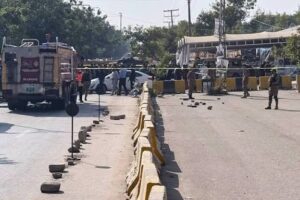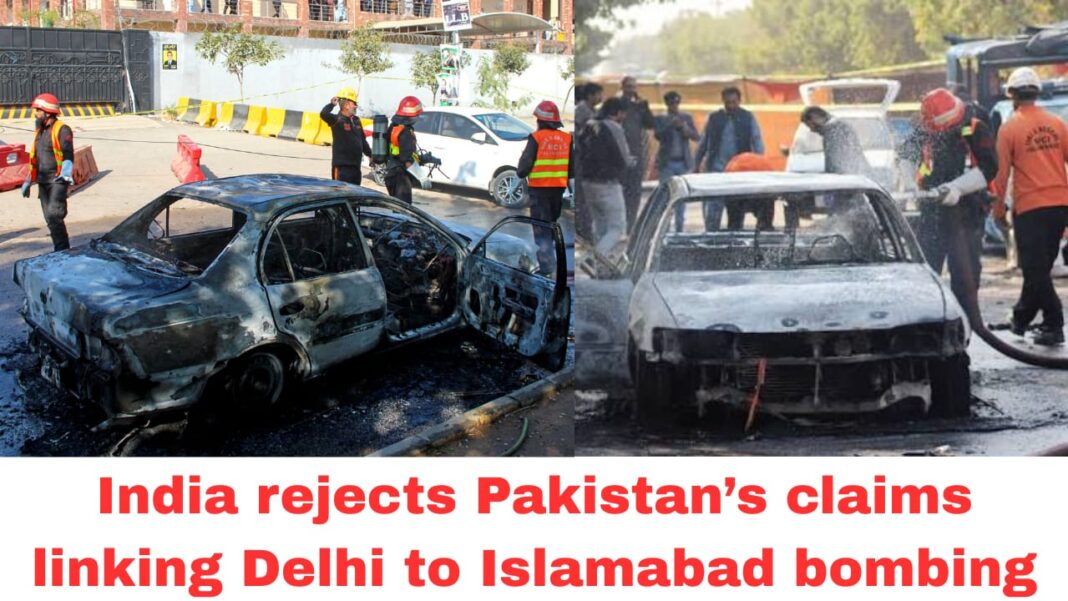Digital News Guru National Desk:
India Dismisses Pakistan’s Accusations Over Islamabad Court Blast
- A suicide bombing outside the district and sessions court in the G-11 sector of Islamabad, Pakistan, killed at least 12 people and injured many others.
- In the aftermath, Pakistan’s Prime Minister Shehbaz Sharif accused New Delhi (i.e., India) of orchestrating the attack through “India-sponsored terrorist proxies” operating out of Afghanistan.
India’s response
- The Ministry of External Affairs (MEA) of India issued a strong statement rejecting the accusations as “baseless and unfounded”.
- MEA spokesperson Randhir Jaiswal said:
“India unequivocally rejects the baseless and unfounded allegations being made by an obviously delirious Pakistani leadership. It is a predictable tactic by Pakistan to concoct false narratives …”

- India further stated that the international community is well aware of Pakistan’s internal situation and will not be misled by what India calls “desperate diversionary ploys”.
Why this is significant
- The incident adds to already elevated tensions between India and Pakistan, especially given earlier mutual accusations over cross-border terrorism, Kashmir, etc.
- The Pakistani claim lacks publicly presented evidence, according to Indian sources. India’s rebuttal suggests Islamabad may be shifting blame amid its internal political/constitutional issues.
- The strong language used by India (“predictable tactic”, “delirious leadership”) underscores how seriously New Delhi views the move — not just as defence but also as a strategic narrative contest.
The immediate sequence of events
According to Pakistani official statements, the bomber attempted to enter the court complex, and after failing to gain access detonated explosives near a police vehicle at the gate. At least 12 people were killed and over 30 were injured.
Shortly thereafter, Prime Minister Shehbaz Sharif accused India of orchestrating the attack — again providing no publicly-shared evidence to substantiate the claim. He also linked the court blast to another attack on a cadet college in Wana (in Khyber-Pakhtunkhwa province), alleging both were the “worst examples” of Indian-state terrorism.
In response, India’s MEA rejected both accusations, emphasising that Pakistan must deal with its internal security and political issues, rather than look externally for scapegoats. India emphasised that the international community should not be fooled by Pakistan’s attempts to shift attention.

Underlying dynamics and context
The current episode must be read against the backdrop of long-standing friction between India and Pakistan. Both countries accuse each other of supporting terrorism; Pakistan often points to alleged Indian operations in Pakistan-administered territories, while India points to militant groups operating from Pakistan on its side of the border.
In Pakistan’s case, the condemnation is unfolding amid domestic turbulence. India’s statement referenced an ongoing constitutional amendment in Pakistan to create a new post of Chief of Defence Forces (CDF), which has been interpreted as a power grab by the military. India’s MEA referenced this when rejecting the allegations, suggesting that Pakistan is using external accusations to obscure internal democratic instability.
Militancy inside Pakistan is also on the rise. The attack in Islamabad is the first major explosion in the capital in a decade. A majority of recent violent incidents in Pakistan’s north-western regions have been attributed to the Tehrik‑e‑Taliban Pakistan (TTP) or its factions; these groups operate in border-zones with Afghanistan and benefit from complicated cross-border dynamics.
Thus, from India’s viewpoint, the Pakistani leadership may have strategic motives to deflect attention from internal governance and security failures by pointing to an external “enemy”. From Pakistan’s viewpoint, publicly blaming India may help maintain a victim-narrative domestically and internationally.
What to watch for next
- Whether Pakistan provides evidence to support its allegations over Indian involvement (or a specific proxy claim).
- Any Indian diplomatic or intelligence response — whether public, bilateral, or via international forums.
- Possible escalation risks: Given the history of India-Pakistan tit-for-tat, such accusations might lead to diplomatic actions, border tensions, or renewed international mediation.
- How other countries or international organisations respond — whether they endorse India’s rejection, call for investigation, or press Pakistan for proof.

Conclusion
The explosive attack in Islamabad and the rapid flurry of accusations it ignited highlight once again how deeply entrenched and volatile the India-Pakistan relationship remains. Pakistan’s decision to point the finger at India, and India’s equally blunt refusal to accept the accusation, reveal more than a disagreement over one event — they expose the strategic narratives both countries deploy in managing internal politics, cross-border security, and international diplomacy.
As both countries step back from the exchange for now, the real question will be whether this incident becomes a bridge to de-escalation — a moment of introspection on terrorism, intelligence and regional peace — or a trigger for renewed confrontation, diplomatic freeze-out, or worse. For now, the world will be watching closely whether evidence, or lack thereof, becomes the turning point.
You May Also Read: Car Explosion Near Delhi’s Red Fort, At Least 8 Killed in Heart of Capital








